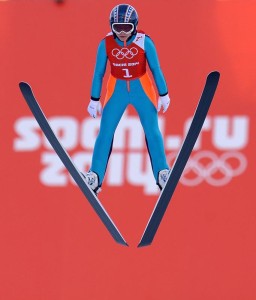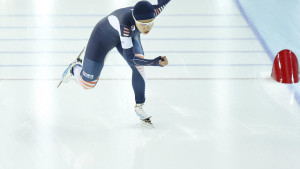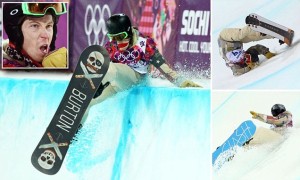Women’s Ski Jumping
In my Day 1 commentary below, I mocked the way the International Olympic Committee was “gilding the lily” by adding so many redundant events (like Team Figure Skating) to the Winter Olympics this year. This is why I feel so incredulous that the (mostly male) members of the IOC forced women ski jumpers to wage a civil rights struggle to have their event added.
Of course, from the marathon to weightlifting, women demonstrated long ago that they have the mental strength and physical toughness to compete in any Olympic sport men compete in.
Yet:
The IOC argued ski jumping was simply too dangerous. The female jumpers repeatedly found themselves responding to the idea that jumping would injure their ovaries – a claim the former U.S. women’s coach, Larry Stone, scoffs at.
(CBS News, February 9, 2014)
 Indeed, that women are finally jumping 90 years after the men is thanks in large part to women jumpers responding to that ignorant and chauvinistic idea with cogent and unassailable declarations as follows:
Indeed, that women are finally jumping 90 years after the men is thanks in large part to women jumpers responding to that ignorant and chauvinistic idea with cogent and unassailable declarations as follows:
My baby-making organs are on the inside. Men have an organ on the outside. So if it’s not safe for me jumping down, and my uterus is going to fall out, what about the organ on the outside of the body?
This was no less a person than pioneer jumper Lindsey Van sounding off on the February 13, 2013 edition of Rock Center on NBC. It’s probably the bane of her competitive life that her name is so similar to that of another more famous Lindsey. But Van’s name will go down in the annals of history along with those of women like Patsy Mink and Edith Starrett Green. Recall that Mink and Green fought for the passage of Title IX, which guaranteed girls and women in the United States the same opportunities as boys and men in any field of education – particularly in high school and college sports.
Alas, competing as a pioneer in this sport did not guarantee she’d win gold, or any Olympic medal. She placed 15th. Also noteworthy is that Sarah Hendrickson, whose good looks made her more the face of this pioneering sport than the pioneer Van herself, finished 21st.
Carina Vogt of Germany won gold; Daniela Iraschko-Stolz of Austria, silver; and Coline Mattel of France, bronze.
Women’s Speedskating 500 (long track)
 Listening to commentators remark on the lighting speed of, um er, speedskater Sang-Hwa Lee of the Republic of Korea, I could not help thinking of similar remarks during the 2000 Summer Games in Sydney, Australia on the lightening speed of sprinter Marion Jones of the United States.
Listening to commentators remark on the lighting speed of, um er, speedskater Sang-Hwa Lee of the Republic of Korea, I could not help thinking of similar remarks during the 2000 Summer Games in Sydney, Australia on the lightening speed of sprinter Marion Jones of the United States.
Except that Jones turned out to be nothing more than the female heir to the Olympic legacy of Ben Johnson. And, even though the way Lee skated was like poetry in motion, I’m not alluding here to the poet Johnson.
Interestingly enough, I’ve heard nothing so far of the doping controversies and disqualifications that attend most Olympic Games these days. Not that Lee’s unbelievable performance screamed out for investigation, mind you. Indeed, if athletes are doping, it’s probably those competing in the Tour de France-like Cross-Country events, which is second only to Weightlifting in the number of athletes in one sport who have had Olympic medals revoked for doping since the IOC instituted drug testing in 1968.
At any rate, it came as no surprise when Lee ended up winning gold in record-setting fashion. Olga Fatkulina of Russia won silver; Margot Boer of the Netherlands, bronze.
Men’s Halfpipe
I don’t mind admitting that, in my Day 1 commentary below, I joined the peanut gallery of those heaping scorn on Shaun White for withdrawing from Slopestyle. He is easily the biggest name in snowboarding. Yet he claims it’s too dangerous. Worse still, he admits he withdrew to give himself a better shot at gold in Halfpipe.
 Except that, after watching snowboarder after snowboarder crash-land all manner of exotic tricks, I began thinking that White unwittingly ended up competing in the more dangerous event. Apropos of which, with Slopestyle, Halfpipe, and other snowboarding events, the IOC is clearly trying to grow interest in the Winter Olympics by featuring events that have made the Winter X-Games must-see TV.
Except that, after watching snowboarder after snowboarder crash-land all manner of exotic tricks, I began thinking that White unwittingly ended up competing in the more dangerous event. Apropos of which, with Slopestyle, Halfpipe, and other snowboarding events, the IOC is clearly trying to grow interest in the Winter Olympics by featuring events that have made the Winter X-Games must-see TV.
No doubt White fully appreciated that, if he didn’t win Halfpipe after withdrawing from Slopestyle, his agony of defeat would be surpassed only by his stigma of humiliation.
Well, here’s to the schadenfreude I fully anticipated would come: White did not even make the podium in Halfpipe! Frankly, it’s fair to say that never before in the history of the Olympic Games has an athlete so hyped to win gold failed to even win bronze. He finished fourth.
‘Fourth was a gift, man,’ U.S. teammate Danny Davis said of White. Davis finished 10th and Greg Bretz 12th as the United States failed to medal for the first time in the event.
‘We let America down,’ Davis said. ‘Sorry, America.’
(Yahoo Sports, February 11, 2014)
 The reason for Davis’s apology, of course, is that these snowboarding events were invented in the United States. Therefore, getting shut out in this fashion is rather like American Basketball teams getting completely shut out of the medals. In any case, I wish White lots of luck in pursuing what seems to be his greater interest these days anyway, namely, becoming a rock star!
The reason for Davis’s apology, of course, is that these snowboarding events were invented in the United States. Therefore, getting shut out in this fashion is rather like American Basketball teams getting completely shut out of the medals. In any case, I wish White lots of luck in pursuing what seems to be his greater interest these days anyway, namely, becoming a rock star!
Louri Podladtchikov of Switzerland won gold; Ayumu Hirano of Japan, silver; and Taku Hiraoka also of Japan, bronze.
MEDAL COUNT
Norway: 11; Canada: 9; Netherlands: 8